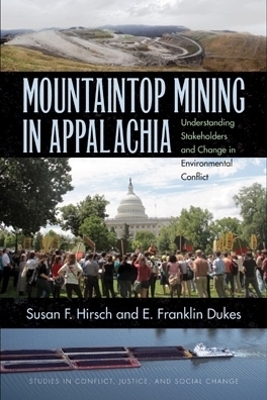
Mountaintop Mining in Appalachia
Ohio University Press (Verlag)
978-0-8214-2109-3 (ISBN)
- Lieferbar (Termin unbekannt)
- Versandkostenfrei innerhalb Deutschlands
- Auch auf Rechnung
- Verfügbarkeit in der Filiale vor Ort prüfen
- Artikel merken
Residents of the Appalachian coalfields share a history and heritage, deep connections to the land, and pride in their own resilience. These same residents are also profoundly divided over the practice of mountaintop mining—that is, the removal and disposal in nearby valleys of soil and rock in order to reach underlying coal seams. Companies and some miners claim that the practice has reduced energy prices, earned income for shareholders, and provided needed jobs. Opponents of mountaintop mining argue that it poisons Appalachia’s waters and devastates entire communities for the sake of short-term gains.
This conflict is emblematic of many other environmental disputes in the United States and around the world, disputes whose intensity derives not only from economic and environmental stakes but also from competing claims to individual and community identity. Looking beyond the slogans and seemingly irreconcilable differences, however, can reveal deeper causes of conflict, such as flawed institutions, politics, and inequality or the strongly held values of parties for whom compromise is difficult to achieve.
Mountaintop Mining in Appalachia focuses on the people of the region, the people who have the most at stake and have been the most active in trying to shift views and practices. By examining the experiences of these stakeholders and their efforts to effect change, Susan F. Hirsch and E. Franklin Dukes introduce key concepts and theories from the field of conflict analysis and resolution. They provide a compelling case study of how stakeholders challenge governance-as-usual, while offering insight into the causes of conflict over other environmental issues.
Susan F. Hirsch is professor and the Vernon M. and Minnie I. Lynch Chair at the School for Conflict Analysis and Resolution at George Mason University. She is the author of Pronouncing and Persevering: Gender and Discourse in an African Islamic Court, In the Moment of Greatest Calamity: Terrorism, Grief, and a Victim’s Quest for Justice, and Mountaintop Mining in Appalachia: Understanding Stakeholders and Change in Environmental Conflict. E. Franklin Dukes is a mediator, teacher, and researcher who directs the Institute for Environmental Negotiation at the University of Virginia. He is the author of Resolving Public Conflict: Transforming Community and Governance and coauthor of Reaching for Higher Ground: Creating Purpose-Driven, Principled, and Powerful Groups, among many other publications.
| Reihe/Serie | Studies in Conflict, Justice, and Social Change |
|---|---|
| Verlagsort | Athens |
| Sprache | englisch |
| Maße | 152 x 229 mm |
| Themenwelt | Naturwissenschaften ► Biologie ► Ökologie / Naturschutz |
| Sozialwissenschaften ► Politik / Verwaltung ► Staat / Verwaltung | |
| Technik ► Bergbau | |
| ISBN-10 | 0-8214-2109-3 / 0821421093 |
| ISBN-13 | 978-0-8214-2109-3 / 9780821421093 |
| Zustand | Neuware |
| Haben Sie eine Frage zum Produkt? |
aus dem Bereich


